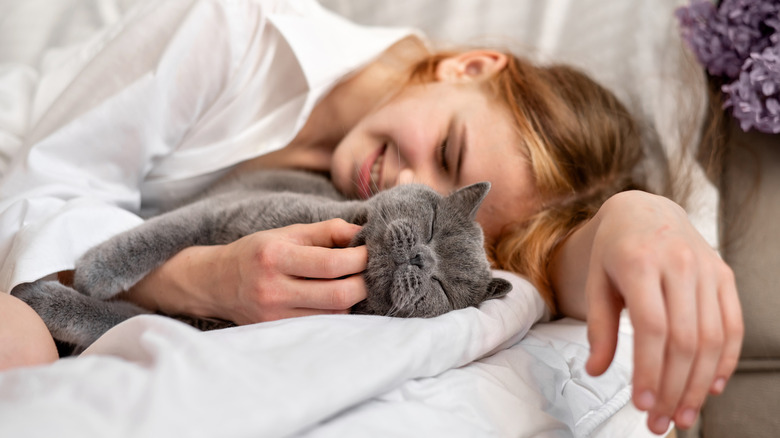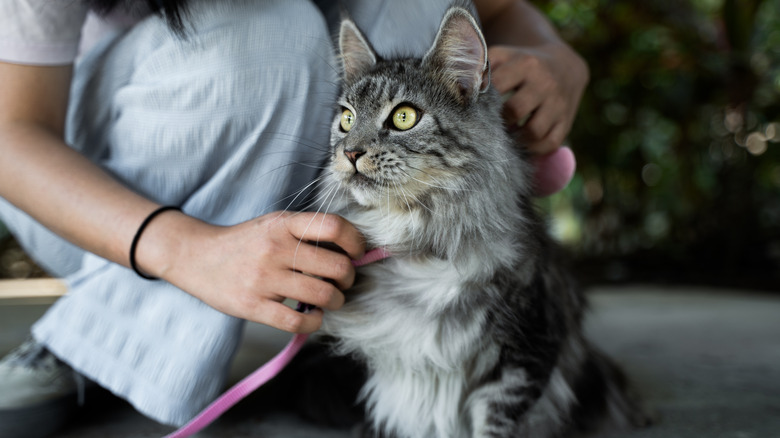It Turns Out Therapy Cats Are A Thing - This Is How They Work
Cats sometimes get a bad rap. After all, cats claw the couch, knock objects off tables, jump on things they shouldn't, and so on. Yet, anyone who's ever been around a well-behaved cat knows these animals can also be calming and pleasant. What many people don't know is that a cat can even serve as registered therapy animals for strangers. After all, not everyone is a dog fan, and some people prefer the presence of felines over canines. Plus, cats can provide all of the same mental and emotional benefits that dogs can.
If you're a cat parent, you know firsthand how comforting it is to have one of these animals cuddled up on your lap or lying beside you, especially if it's a kitten. Feeling its soft fur under your fingertips and palms, and having it rub against you in approval is the icing on the cake. That is, unless you're allergic. Some cats welcome the opportunity to create these same positive reactions for people they've never met before. In fact, some doctors incorporate feline-assisted therapy as a form of supplemental treatment for patients with psychological and physical conditions.
Therapy cats physically interact with humans in various places to ultimately provide some level of physical, emotional, or mental comfort. These include hospitals, nursing homes, schools, universities, and other facilities. However, before a cat can visit these places with the goal of providing therapy, it must first be registered as a therapy pet.
How to register a cat as a therapy cat
To become an official therapy pet, a cat has to meet a list of criteria. Pet Partners, an organization that registers pets as therapy animals, requires that cats be at least a year old, be litter box trained, and have a friendly temperament with no history of aggression. The cats also need to enjoy interacting with and being touched by strangers. In many cases, it's best to prepare a cat for these behaviors when it's a kitten. A clean bill of health, updated vaccinations, and harness and leash training your cat are also essential components of the registration process.
If a cat checks all these boxes, the owner can seek therapy registration from a specific pet organization. The International Cat Association and the International Community of Anthrozoology are two other organizations that register cats as therapy cats. Typically, the prospective feline undergoes a behavioral and physical evaluation and receives the stamp of approval and official therapy cat registration if it passes. A registration fee may also apply.
Therapy cats have been proven to help treat a wide range of conditions
A Polish Annals of Medicine article published on ScienceDirect showed that physically interacting with a cat can help treat heart disease, mental illness, ADHD, diabetes, autism, and other conditions. These scenarios are examples of feline-assisted therapy. Since not all people interact with cats the same way, and not all cats interact with humans the same way, including how much a person plays with a cat each day, a feline-assisted therapy session could vary from patient to patient. It might consist of a person gently petting the cat several times or having the cat simply lie in close proximity.
Physically interacting with a cat can do wonders for the mind and body. Petting a cat (or a dog) affects the frequency of certain brain waves, resulting in a state of relief and relaxation. As a result, stress and depression can be alleviated, and immune function can be stimulated. There's also evidence that a cat's purring can deliver physical and mental benefits, including lowering the risk of asthma.
If a cat is involved in a feline-assisted therapy program, it either lives in the therapeutic institution (hospital, etc.) permanently or only visits periodically. Some facilities, including the appropriately named Cat Therapy in Santa Barbara, California, give students the opportunity to come interact with dozens of cats as a way to destress before final exams. Whether you're looking to make your cat into a therapeutic companion, or just enjoy the cuddles, our feline friends are definitely helping.


